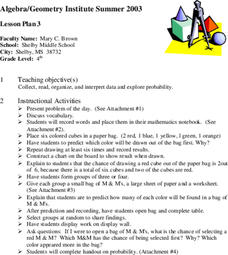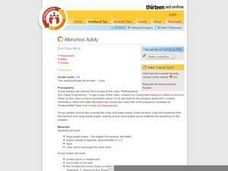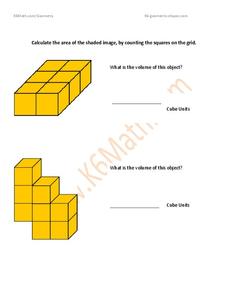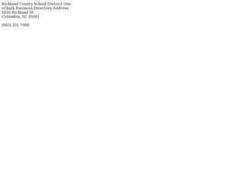Curated OER
Groups of Ten Tens
In this place value worksheet, students read about counting by tens using rows of cubes. They circle groups of 10 rows and write how many hundreds they make.
Curated OER
Show Me the Number
Second graders develop the ability to show two-digit numbers using place value attributes in the early additive stage five. They utilize the manipulative's of sticks, rubber bands, counters, small canisters and uni-link cubes to assist...
Curated OER
Exploring Probability
Fourth graders participate in a instructional activity that explores probability. They use candy and model cubes to experiment with different outcomes that can be charted if the students can proceed to the objective of the instructional...
Curated OER
Color Me Square
Second graders identify and describe basic geometric solids. Working as a class, 2nd graders describe geometric solids using the proper vocabulary and counting faces, bases, corners, and edges. In pairs, students use a computer drawing...
Curated OER
I See a Rainbow
Students identify the different colors in a rainbow. They experiment with dropping food coloring into a water and then making ice cubes. They discuss what happens to the water in the freezer
Curated OER
Don't Box Me In
Students explore the relationship between flat and three-dimensional shapes. They identify the names of 3-D shapes and construct cubes from squares.
Curated OER
Finding a Difference
Students find a small difference by counting up from the smaller to the larger number. They count the ones that don't match, lay them horizontally to match them to the orientation of the number line and show the two numbers on...
Curated OER
Calculate Area Using Shaded Grids
In this area worksheet, students calculate area of shapes using shaded grids, writing answers in cube units. A reference web site is given for additional activities.
Curated OER
Construct Figures to Find Specific Volume
Sixth graders use number cubes to explore volume of two-dimensional shapes. They roll a die and construct a shape using the numbers rolled as measurements of the sides. They estimate the volume of a given object, and then use the...
Curated OER
Fourths of Sets
Students create a set of cards that represent factors of four and use these cards to play a game in which they practice separating numbers into fourths. They first practice separating numbers into fourths with a projected computer...
Curated OER
Discovering Solids
Second graders engage in a lesson that is about the discovery of solids. They identify using shapes like cones, spheres, cylinders, and cubes in various different situations. Students explore the classroom in order to find examples of...
Curated OER
Brain Booster: Estimation and Repeated Addition
In this daily math problem worksheet, students complete three activities that help use estimation and solve problems with repeated addition. Students show their work using pictures, numbers, or words and may use cubes, number lines or...
Curated OER
Brain Booster: Subtraction Strategy- Working Backward
In this daily math problem worksheet, students complete three activities that help them use subtraction and work backwards. Students show their work using pictures, numbers, or words and may use cubes, number lines or hundred boards for...
Curated OER
Joining (Addition) & Separating (Subtraction) - Result Unknown
How much is the total? How many more is left? These basic questions are asked of students through two story problems that involve catching fish on a weekend fishing trip and goal of reading a certain number of books. Your learners will...
Curated OER
Patterns
Second graders create an ABAB pattern with their name. In this early elementary math lesson, 2nd graders first model their names in an ABAB pattern with unifix cubes. They then recreate the pattern using letter stamps on KidPix.
Curated OER
Lemonade Stand
In this multiplication worksheet, students use the given spinner to play a multiplication game. Students play with a partner completing 6 rounds and the given graphic organizers.
Curated OER
2nd Grade - Act. 17: Source Relay
Help your 2nd graders understand the difference between natural and man-made materials. They will sort breakfast food items into sources: store, factory, natural world, and farm. They will work together to classify, form conclusions, and...
Mathematics Assessment Project
Skeleton Tower
Who doesn't like building blocks? In the task, pupils use a given diagram of a tower to determine the number of needed blocks. Using this information, pupils then develop a function rule relating the height of the tower to the number of...
Curated OER
Ways to Make 9 and 10
Word problems are great skill builders! Here are 6 basic word problems intended to boost addition skills. Leaners work through each problem and discover various ways to make 9 and 10.
Curated OER
Find Volume
For this finding volume practice worksheet, students sharpen their problem solving skills as they solve 6 problems that require them to find volume.
Curated OER
Step Into My Shoes
Students order their classmates from smallest to largest foot length. In this ordering their classmates from smallest to largest foot length lesson, students trace each of their classmates foot. Students read a story called, 'How Big...
Curated OER
Perimeter, Area and Volume
In this geometry instructional activity, 10th graders solve problems by finding the perimeter, area and volume of polygons. There are 17 questions with an answer key.
Curated OER
Sunshine Math- 2 Earth, XVI
In this math applications worksheet, students solve 8 word problems that include basic operations, money, reasoning, and telling time.
Curated OER
Building Buildings
Seventh graders investigate 2-D and 3-D objects. In this geometry lesson, 7th graders begin to understand spatial reasoning. Students look at pictures of the NYC Skyline and discuss what it looks like from different views. Students use...
Other popular searches
- Counting Cubes Worksheets
- Volume by Counting Cubes
- Counting Cubes and Sorting
- Counting Cubes for Area
- Volume Counting Cubes
- Counting Cubes in Volume
- Counting Cubes in Addition
- Counting Cubes for Volume
- Counting Cubes in Structures

























